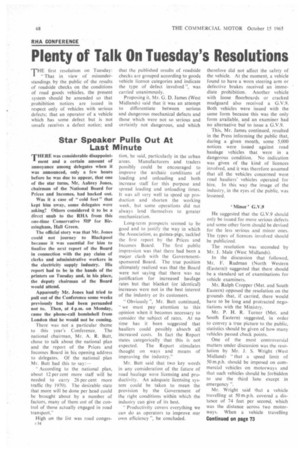Star Speaker Pulls Out At Last Minute
Page 70

If you've noticed an error in this article please click here to report it so we can fix it.
THERE was considerable disappoint ment and a certain amount of annoyance among delegates when it was announced, only a few hours before he was due to appear, that one of the star turns, Mr. Aubrey Jones, chairman of the National Board for Prices and Incomes, had backed out.
Was it a case of "cold feet" that kept him away, some delegates were asking? Others considered it to be a direct snub to the RHA from this one-time Conservative MP for Birmingham, Hail Green.
The official story was that Mr. Jones could not journey to Blackpool because it was essential for him to finalize the next report of the Board in connection with the pay claim of clerks and administrative workers in the electricity supply industry. His report had to be in the hands of the printers on Tuesday and, in his place, the deputy chairman of the Board would attend.
Apparently Mr. Jones had tried to pull out of the Conference some weeks previously but had been persuaded not to. Then, at 4 p.m. on Monday, came the phone-call bombshell from London that he would not be coming.
There was not a particular theme to this year's Conference. The national chairman, Mr. A. R. Butt, chose to talk about the national plan and the report of the Prices and Incomes Board in his opening address to delegates. Of the national plan Mr. Butt had this to say:— " According to the national plan, about 12 per cent more staff will be needed to carry 26 per cent more traffic (by 1970). The desirable state that more will be done per head could be brought about by a number of factors, many of them out of the control of those actually engaged in road transport."
High on the list was road conges(.34 tion, he said, particularly in the urban areas. Manufacturers and traders possibly could be encouraged to improve the archaic conditions of loading and unloading and both increase staff for this purpose and spread loading and unloading times. It was all very well to speed up production and shorten the working week, but some operations did not always lend themselves to greater mechanization.
Long-term prospects seemed to be good and to justify the way in which the Association, as guinea-pigs, tackled the first report by the Prices and Incomes Board. The first public impression was that there had been a major clash with the Governmentsponsored Board. The true position ultimately realized was that the Board were not saying that there was no justification for increased haulage rates but that blanket (or identical) increases were not in the best interest of the industry or its customers.
"Obviously ", Mr. Butt continued, " we must pay attention to this opinion when it becomes necessary to consider the subject of rates. At no time has it been suggested that hauliers could possibly absorb all increased costs. In fact the Report states categorically that this is not expected. The Report stimulates thought on ways and means of improving the industry."
Mr. Butt said that two key words in any consideration of the future of road haulage were licensing and productivity. An adequate licensing system could be taken to mean the provision by the Government of the right conditions within which the industry can give of its best, Productivity covers everything we can do as operators to improve our own efficiency ", he concluded.








































































































































